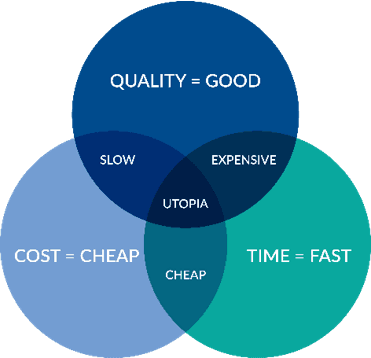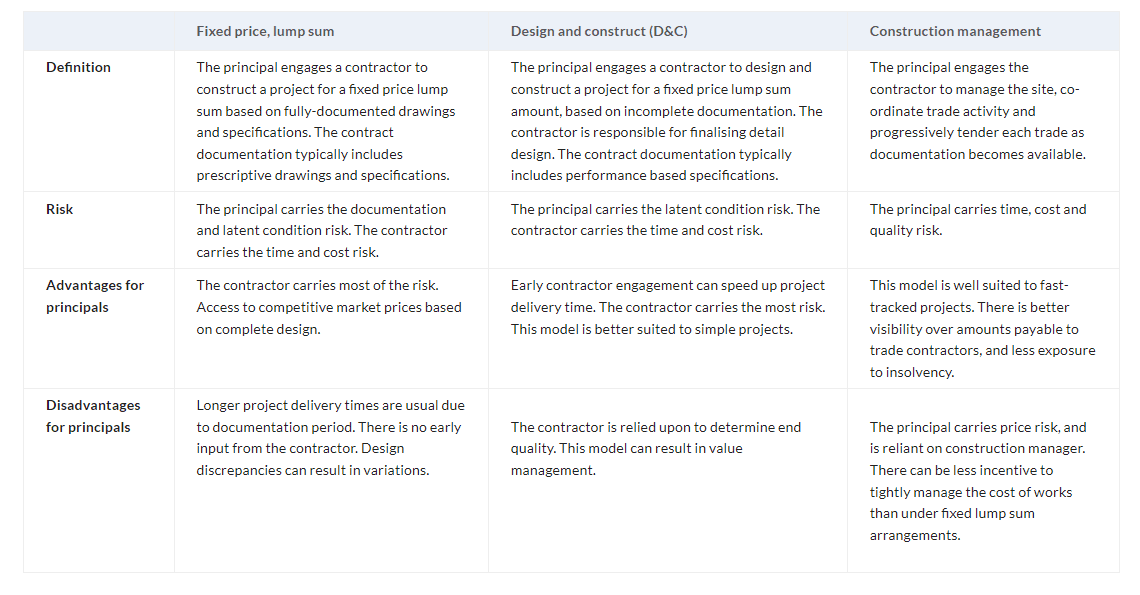A clear contract lays a strong foundation for a successful construction project
A contract outlines the duties and obligations of all parties, and provides protections if the parties fail to meet those obligations. But the best contracts do even more – helping to build relationships and establish communication channels long before the ink is dry.
Deciding on the right form of contract is mission-critical when embarking on any construction project. In this article, we unpack the different contract types and share some sound advice on strategies that can avoid the biggest pitfalls and create winning partnerships.
What type of construction contract should I use?
Choosing the right contact can set your project up for success, but the type of contract you select also depends on the size and complexity of the project. Regardless of the scale of your ambitions, the contract must comply with legislative requirements.
There are three common types of contract used in Australia: Fixed price, lump sum; Design and construct, often shortened to D&C; and construction. In addition to these, other less common forms of contract include: alliance, Time and materials, referred to as T&M; and Early contractor involvement, known as ECI.
Each contract addresses risk – that is, time, cost and quality liabilities – between the principal and contractor, but does so in different ways.
Ask and answer these questions to find the right contractual solution
Before you consider the three contract types, ask yourself these key questions:
Cost: How big is my budget? How much can I allocate for contingencies and cost blow outs?
Time: How important is a fast-tracked program? Am I prepared to take longer to get a better result?
Risk: How comfortable am I with taking on project risks (and reaping the potential rewards)?
Innovation: Is innovation a priority for me on this project? Am I looking to take advantage of construction efficiencies?
Control: How much control do I want over the design? Do I want a design that is ‘locked and loaded’ from the outset or am I comfortable with a more organic and evolving process?
Accountability: Do I want a single point of responsibility for design and construction?
Collaboration: Am I keen for a partnership approach? Or do I want to call all the shots?
To guide your decision making, consider the classic time, cost and quality diagram.

While all good contracts are looking for to hit that elusive sweet spot between time, cost and quality, it is rarely achieved and compromises must be made. Which element are you ready to compromise to achieve your result? This can give you clues to the best contract type for your project.
How to balance risk and reward
Now let’s take a closer look at the advantages, disadvantages and risks associated with three main types of construction contracts.

The three big risks from the principal's perspective

Delivery strategy against time, cost and quality

Strategies for success
Invest the time upfront: Spending time and resources upfront can deliver dividends in the long-run. Good contract documents, developed prior to construction, should clearly communicate expectations around the product, timing and behaviour of all parties.
Make risk a priority: Identify, evaluate and allocate risk throughout the project to significantly reduce the volume and severity of potential claims.
Manage change: Introduce efficient and robust processes that address change fairly and transparently, and eliminate at least some of the pinch points that typically generate disputes.
Keep a robust record: Good record keeping reflects good management processes and mitigates the risk of disputes escalating later in the process.
Ask yourself
During contract formation…
Procurement routes: Are these aligned with project expectations?
Process management: Is it defined and workable?
Contract administration: Will I use a consultant or third-party specialist?
Communication: Will relationships be mapped and expectations set early on?
During contract review…
Contract documents: Are they clear, complete and enforceable (fair and reasonable)?
Project specifics: Have the standard form(s) of contract been adapted to the particulars of the project and management plan where appropriate?
Communication: Will relationships be mapped and expectations set from the outset?
Conflict management: How will delays be dealt with (notices/submissions / recovery schedule requirements)
When it’s time to engage the experts
At every stage – from estimate to tender, on-site construction to post-construction close-out – a quantity surveyor can provide professional advice and peace of mind. Quantity surveyors are accustomed to counting up the costs while balancing risk and reward, and can provide input into a well-drafted contract that appropriately allocates risk and provides certainty in project outcomes.
With the right specialists, skilled in monitoring and validating contracts, you can make informed decisions. Altus Group’s trusted experts can help you to:
Develop sound contracts that define performance criteria, reasonable contractual obligations and fair dispute resolution provisions that underpin project success
Protect your interests with a strategic and commercial approach to contract risk, project delays, change management and disputes
Avoid negative cost and schedule impacts caused by invalid change orders by undertaking a detailed review that establishes entitlement under the contract
Fairly distribute realistic costs by analyzing the actual cause and effect of project delays
Present or defend claims backed by expert opinion and industry-accepted analysis
Negotiate solutions that settle disputes without costly litigation
Identify liability and present your case with the support of a thorough cost and schedule analysis.
Whether you need help issuing progress claims or extensions of time, detailing variations or undertaking comprehensive contract reviews, a quantity surveyor can help. By choosing the right skills to help you monitor progress and validate claims, you can foster transparency and certainty on your next project.
Author

Altus Group
Author

Altus Group
Resources
Latest insights







